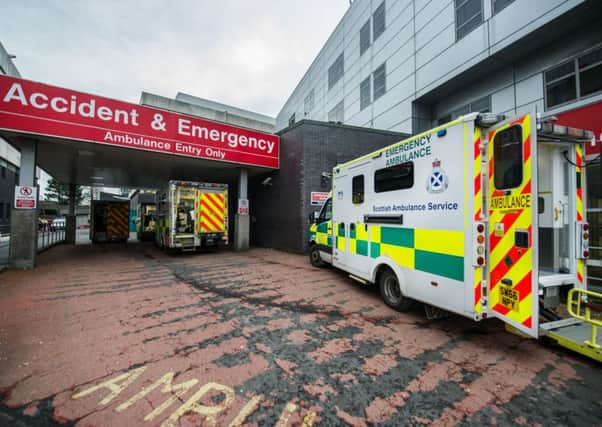More than a third of ambulances fail to reach patients in eight minutes


New figures have revealed that of 64,225 ambulances called to life threatening incidents last year, 23,751 took more than eight minutes – the equivalent of 37 per cent or 65 patients a day.
The data was retrieved by Scottish Labour under a Freedom of Information (FoI) request. Labour last night claimed the pressure on the Scottish Ambulance Service was another sign of an overstretched NHS and renewed calls for Shona Robison to quit as Health Secretary.
Advertisement
Hide AdAdvertisement
Hide AdThe figures came to light in a week where terminally ill cancer patient Margaret Goodman also urged Ms Robison to step down after waiting more than two hours for an ambulance to take her to hospital.
The official Scottish Ambulance Service target is for 75 per cent of emergency calls to be responded to within eight minutes. The 75 per cent threshold is based on Scotland’s geography and to allow for the fact it can take an ambulance longer to get to a life-threatening incident in remote areas like the Highlands. The FoI figures revealed 63 per cent of the emergency calls were responded to within the eight-minute timeframe – a figure still some way short of the 75 per cent target.
Further analysis of the data also suggested two patients had to wait for more than five hours for an ambulance in the West Central district.
Labour’s health spokesman Anas Sarwar said it was “utterly shocking” that so many ambulances were failing to get to emergencies within eight minutes.
“In life-threatening situations, every minute counts,” Mr Sarwar said. “Our ambulance service, like the rest of our NHS, is currently understaffed, under-resourced and under far too much pressure.
“We cannot go on like this. Every aspect of our health service is stretched to near breaking point.”
The performance of ambulances came under scrutiny this week when Scottish Labour leader Richard Leonard raised Ms Goodman’s case at First Minister’s Questions.
Earlier this month, Ms Goodman, who is suffering from an aggressive brain tumour, collapsed in agony in her house in Clackmannanshire.
Advertisement
Hide AdAdvertisement
Hide AdHer husband found her curled in a ball at 11:30pm on 7 April. He phoned the palliative care helpline set up for her.
District nurses arrived and declared the situation a medical emergency. They phoned 999 for an ambulance on three occasions before being called to another incident. Mr Goodman phoned at 2:15am to be told there was no record of previous calls. He made the decision to drive his wife to hospital where she was finally seen by a doctor at 7am.
The Scottish Ambulance Service said longer response times may happen because a call was originally categorised as non-immediately life-threatening, but was then upgraded. The service also pointed out that 75 per cent of patients were reached in less than ten minutes and 96 per cent within 20 minutes across Scotland.
“We are proud of the results our ambulance crews have achieved in saving lives,” a spokesman said. “Their hard work has ensured our median response time for immediately life threatening incidents is currently seven minutes and nine seconds. Crucially, they have almost doubled survival rates for cardiac arrest patients since 2013.”
A Scottish Government spokesman said: “While response time is an important, it is also the clinical expertise of ambulance teams that saves lives. We’ve invested almost £900 million in the Scottish Ambulance Service in the last four years and are committed to supporting the service to train an additional 1,000 paramedics over the course of this parliament.”